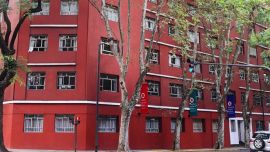Doctor-turned-National Deputy Ayelén Spósito (Frente de Todos-Río Negro) has returned to her home province and the medical profession to fight coronavirus at the Aníbal Serra de San Antonio Oeste Hospital in San Antonio Oeste.
“Given the worrying epidemiological situation we are undergoing, I’ve come to reinforce the work of my colleagues since last year with the commitment of always,” tweeted Spósito, who clarified that she would not be resigning her seat or requesting leave.
Born in Buenos Aires City, the 35-year-old lawmaker entered Congress in 2019 to replace General Roca Mayor María Emilia Soria.
"From the start of the pandemic, I met up with the director of the San Antonio Oeste hospital where I worked and placed myself at her disposal. I feel an obligation to be there in this context," the deputy told RN Radio 89.3.
Spósito explained that last year they summoned her to monitor isolated people and that she participated "without putting aside" her legislative activity.
She recounted that last Saturday "they called me from the emergency ward to see if I could transfer a patient so I joined in," adding: "I pay attention to the indications they give me."
Her decision was taken in response to an urgent call by the hospital in Facebook. Spósito asked for “empathy” “to cut the chain of contagion.”
"We know that there will be no sessions this week," she said to justify her absence from Congress, explaining: "The idea is to cover the two jobs for as long as I can."
Upon her return, the Chamber of Deputies will debate the Covid emergency bill, which has already been approved by the Senate.
"There is a responsible opposition and another less so. Those deputies who understand the situation of the country also managed to understand the importance of postponing the elections," she commented.
Situation in Río Negro
Last month there was an exponential increase of cases in her province of Río Negro due to the new strains being more contagious and an almost unrestricted circulation.
In this nationwide second wave Río Negro has detected a lower average age of both the infected and the deceased, explained in part by the advanced vaccination of the elderly.
This made May the worst month of the pandemic for Río Negro and Neuquén, comparable only to last October at the peak of the first wave.
“The hospital of the zone is now collapsed with great difficulty in finding available beds,” explained deputy Spósito in another interview.
With the occupancy of intensive care beds running at 100 percent, Río Negro accumulated in May 13,728 confirmed cases of contagion and 291 deaths as against 246 deaths last October.
“Use a face-mask, comply with the social distancing of two metres, do not go to any meetings which are not indispensable, wash your hands constantly or use alcohol-based hand gel and ventilate all rooms. Remember that you will always be able to count on us [doctors] but we need your help because the exit from this situation is collective,” requested deputy Spósito.
– TIMES/PERFIL





















Comments